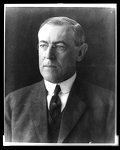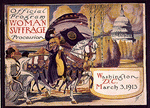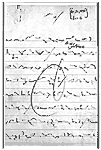Today in History: December 28
It is not needful or possible at this time, whilst yet he lives, to say that Wilson is a Washington or another Lincoln, but he is a great American. He is one of the great presidents of American history.Rabbi Stephen A. Wise in a tribute to Woodrow Wilson.
American Leaders Speak, 1918-1920

Woodrow Wilson, circa 1912.
Portraits of the Presidents and First Ladies, 1789-Present
Thomas Woodrow Wilson was born on December 28, 1856, in Staunton, Virginia. The twenty-eighth president of the United States, Wilson served two consecutive terms in the White House, from 1913 to 1921.
Before entering politics, Wilson taught at Bryn Mawr College and Wesleyan University, and later served as president of Princeton University. At Princeton, he earned a national reputation for his political addresses and articles, which contributed to his election as governor of New Jersey in 1910. Two years later, the Democratic National Convention nominated Wilson to run for president.
On the day before Wilson's inauguration in March 1913, members of the Congressional Union, later known as the National Women's Party, organized a suffrage parade in Washington, D.C. to siphon attention away from inaugural events. It is said that when Wilson arrived in town, he found the streets empty of welcoming crowds and was told that everyone was on Pennsylvania Avenue watching the parade.

Official Program, Woman Suffrage Procession, Washington, D.C., March 3, 1913.
"Votes for Women" Suffrage Pictures, 1850-1920
Suffrage was only one of the volatile issues Wilson faced during his presidency. His progressive measures for domestic reform often met with opposition, and in foreign policy he faced greater challenges than any president since Abraham Lincoln. Determining whether or not to involve the U.S. in World War I severely tested his leadership.
Wilson was initially reluctant to involve the U.S. in World War I. With increased pressure, the United States entered the conflict with a formal declaration of war against Germany on April 6, 1917. Less than a year later, on January 8, 1918, Wilson made his famous "Fourteen Points" address, introducing the idea of a League of Nations, an organization that would strive to help preserve territorial integrity and political independence among large and small nations alike.

Shorthand Notes for the "Fourteen Points," Woodrow Wilson, January 8, 1918.
Words & Deeds in American History
Wilson intended the Fourteen Points as a means toward ending the war and achieving an equitable peace for all the nations. He worked tirelessly to promote his plan at the 1919 Paris Peace Conference. The charter of the proposed League of Nations was incorporated into the conference's Treaty of Versailles, but most of the other Fourteen Points fell by the wayside.
For his peacemaking efforts, Wilson was awarded the 1919 Nobel Peace Prize. Receiving the award was bittersweet, however, because he was unable to convince congressional opponents, such as Henry Cabot Lodge, to support the resolution endorsing U.S. entry into the League. United States membership, Wilson believed, was essential to ensuring lasting world peace.
In 1921, Wilson and his second wife Edith Bolling Galt Wilson retired from the White House to a home in the Embassy Row section of Washington, D.C. Wilson died there on February 3, 1924. Mrs. Wilson stayed in the home another thirty-seven years, passing away on December 28, 1961.
- Search on Woodrow Wilson in the Today in History Archive to find more events related to the president. Learn, for example, about the contentious 1912 Republican Convention, which paved the way for the Democratic candidate, Woodrow Wilson, to be elected.

Liberty Loan Posters in General Store, Olga, Louisiana
Russell Lee, photographer, September 1938.
FSA/OWI Photographs, 1935-1945 - Search on the term campaign in the collection Theodore Roosevelt: His Life and Times on Film to see footage of Roosevelt's 1912 and 1916 presidential campaigns against Wilson. This collection also contains 1918 footage of President Wilson [as he] Arrives in New York to Lead Fourth Liberty Loan Parade and of Roosevelt in Baltimore During the Liberty Loan Drive.
- To learn more about the League of Nations, search across American Memory on League of Nations.
- For American opinions on World War I, browse the Subject Index in American Leaders Speak, 1918-1920.
- Learn more about the struggle for women's right to vote. Search on suffrage in the Today in History Archive. Also, be sure to visit the Time Line: One Hundred Years toward Suffrage, a special presentation of "Votes for Women" Suffrage Pictures, 1850-1920.